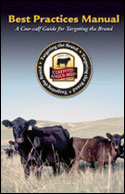Vaccination with Parasite Control
is a Must for a Healthy Herd
Even if producers do everything else by the book for vaccination, if they don't control parasites and monitor nutrition, they may be throwing that investment away.
"I get a lot of herd health calls from producers asking what to vaccinate for," says Christine Navarre, Louisiana State University (LSU) Extension veterinarian. "I won't even talk about vaccination until we've addressed parasite control and nutrition. Without managing those two issues, they may not get all they can out of a vaccination program."
Navarre is not alone in her concern. Parasites are listed by the University of California-Davis School of Veterinary Medicine as one of the common causes of vaccine failure.1
"Studies have shown that parasite loads can reduce an animal's ability to produce a strong humoral and cell-mediated immune response to antigens, such as vaccines,"2 says Frank Hurtig, director, Merial Veterinary Services. "A healthy immune response is necessary for vaccines to be effective. Parasites can hinder that process."
Some of this reduced immune function may be attributed to parasites causing increased stress and malnutrition.3
"Cattle need to be in good condition to get the best possible response to vaccination," Navarre says. "Parasites disrupt stomach function, making it more difficult for cattle to absorb nutrients,3 which acts like poor nutrition. That means cattle may not have the nutrients available to mount an immune response to vaccination."
Fall vaccination and preconditioning programs are designed to help calves prepare for the challenges of weaning and shipping. Hurtig says it is essential that producers also control parasites with a product they can trust, such as an Ivomec® (ivermectin) brand product, as part of their fall protocols to help calves mount a proper immune response to vaccines.
Just as feeder calves need to be treated for parasites, Hurtig says producers also need to include parasite control as part of fall cow and replacement heifer health protocols.
"Fall cow vaccinations serve double duty, protecting the cow and providing immunity to the calf at birth via colostrum," Hurtig says. "These vaccines can head off a lot of trouble and expense for producers, but should be used in conjunction with parasite control to help clear the path for maximum effectiveness."
He says a fall parasite control treatment will not only help ensure that the vaccination program is as successful as possible, but will also help reduce pasture parasite loads and clear cattle of parasites before winter.
To achieve these benefits, Navarre says timing is key. She encourages producers to rethink what herd health practice determines when they work cattle.
"The timing of parasite control is so important that I try to time vaccinations to when parasite control is necessary, not the other way around," Navarre says. "I want to know that timing for parasite control is right because it is more critical than timing for vaccination in many herds."
When choosing a parasite control product this fall, Hurtig notes that producers should consult with a veterinarian for the optimal parasite control practices in their area, read labels carefully and choose a product that will control all of the parasites of concern for their individual herds. It's equally critical, he adds, for producers to protect their parasite control investment by using a product that is backed by a trusted manufacturer.
For more information, producers may contact their veterinarian or local Merial territory manager, visit www.ivomec.com or call 1-888-Merial-1.
1Maas J. Fact Sheet No. 8: Quality Assurance and Vaccines. School of Veterinary Medicine University of California-Davis. Available at: http://danr.ucop.edu/uccelr/vet08.htm. Accessed May 28, 2009.
2Wiggin C., et al. Studies of the immunomodulatory effects of low-level infection with Ostertagia ostertagi in calves. American Journal of Veterinary Research 1989;50(10):1764-1770.
3Ballweber LR. Ruminant parasitology. Veterinary Clinics of North America Food Animal Practice 2006:550-562.




